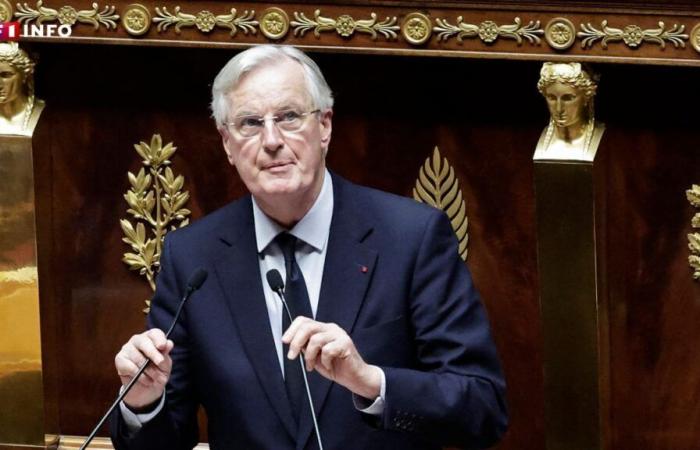
“Macron's Twilight”, “Dance on the Edge of the Volcano”… The foreign press is not going with the back of metaphor to describe the French political crisis.
The risk of the fall of the Barnier government is causing reactions from Washington to Berlin, with marked concern almost everywhere about the crisis that could follow.
A quick overview of some of the main titles.
Follow the full coverage
Motion of censure: the Barnier government is hanging by a thread
“Has France become Greece-sur-Seine?”. The title of this editorial from Wall Street Journal (new window) sets the tone for the concerns of the American press regarding the situation in Paris. The announcement of a motion of censure this Wednesday, December 4, which has every chance of bringing down the Barnier government, is widely followed across the Atlantic. The risk of a major financial crisis in the heart of Europe is being addressed head-on, and the post-Barnier scenarios are already being scrutinized.
Less alarmist than Wall Street Journalthe New York Times (new window) underlines France's staggering debt, but considers that the country can count on a more solid economy than that of Greece, and recalls that the possibility of leaving the euro is absolutely not envisaged – unlike the Greece in 2010 and 2012. France is “too big to fail”in French), estimates the Paris correspondent for European affairs for the American newspaper. Liz Alderman doesn't believe in a “Greek scenario”but notes on the other hand that investors have started to “punish France”by massively reselling their French securities and bonds.
All American newspapers must remind their readers of the political process which led to the current situation, since the dissolution of the National Assembly, of which they have not necessarily followed all the episodes. The risk of a paralyzed French government on January 1 also reminds the American public of its own situations of “shutdown”during parliamentary blockages. Several articles point out the mechanisms that should prevent France from going through such situations, which in the United States can go as far as freezing the salaries of civil servants.
Michel Barnier, well known across the Channel
In Europe, readers have better identified the various characters of the Parisian soap opera since its dissolution last June. The articles are therefore clearly more focused on the balance of power in the Assembly, which led to this “cliffhanger” Monday evening: will the Barnier government fall on Wednesday?
On the British newspaper website The Guardianthe French political crisis is the subject of a “live” (new window)a thread regularly updated with new information and declarations. Michel Barnier is a better known figure in the United Kingdom than elsewhere in Europe, having been the face of Brussels throughout the period of negotiations to leave the euro zone.
The British press is particularly focusing on the last hours before Marine Le Pen's announcement that her group would vote on the NFP's motion of censure. The newspaper The Times (new window) believes that Michel Barnier “was perhaps banking on the fact that Le Pen is not ready, if she brings down her government, to be held responsible for the chaos”. An intuition confirmed in recent hours by information https://twitter.com/leonardattal/status/1863894849134415925?ref_src=twsrc%5Etfw%7Ctwcamp%5Etweetembed%7Ctwterm%5E1863897366455017698%7Ctwgr%5E887075baa1df566f89326316204a5cb7365a8bfe%7Ctwcon%5Es2_&ref_url=https%3A%2F%2Ftf1info-backoffice.prod.athena.tf1.fr%2Flivesaccording to which the Prime Minister declared in front of witnesses: “I didn’t think she would dare.”.
The Guardian wonders about the real motivations of the head of the RN group in the Assembly, recalling her legal troubles. Marine Le Pen opted for censorship after having long rejected the idea, perhaps with a view to an anticipated presidential election if Emmanuel Macron resigned, the newspaper speculates. “She could hope, if she were at the Élysée at the beginning of February, to make the judges' task impossible when they have to decide on her ineligibility on March 31”speculates an analyst from the consulting firm Eurasia Group, cited by the Guardian.
“Twilight of Macron”
“By bringing down the French government, Marine Le Pen is banking on chaos”adds the Swiss newspaper Blick (new window)using the terminology of several French political leaders who have appeared successively on television and radio sets since Monday afternoon. “The Barnier government should fall on Wednesday at 4 p.m.”announces the Zurich daily to its readers, predicting that “France would sink further into the political crisis (…), with the added risk of a financial crisis linked to market confidence”.
More accustomed to parliamentary crises and the falls of governments, the Italian press wants to be more factual, and is already planning on future scenarios. The Turin daily The Press (new window) highlights in particular the mechanisms which will allow the government and state services to continue to function even if a successor to Michel Barnier takes time to be found. The Republic (new window) evokes the “Macron’s twilight”which she judges “without heirs and without allies”facing a “Ungovernable Parliament”.
“The country is back to square one”
In Spain, The Vanguard notes the French political impasse, and also fears the concrete consequences of this crisis on the “second largest economy in the European Union”. The Barcelona daily lists Michel Barnier's concessions to the National Rally, which “should have served to soften the extreme right”, et which will not have prevented it from becoming two days later “the shortest of the Fifth Republic”. The World also recalls the precedent of 1962, which saw the fall of the Pompidou government, under the presidency of Charles de Gaulle. By changing government again, three months after the dissolution of the National Assembly, “the country is back to square one”notes the Paris correspondent of the center-right newspaper, Raquel Villaecija.
“Instability” is also what the Belgian newspaper notes The evening (new window)noting that Michel Barnier will probably not be “no longer in office” at the end of the week. His competitor The Free pointe “the very high risk maneuver” of the triggering of 49.3, “a passage of strength which sounds like a terrible admission of weakness”.
-
Read also
Motion of censure: what scenarios for the Barnier government… and the French?
On the other side of the Rhine, it is mainly the “financial stability” which worries the press. The magazine Managerthe group's business magazine The mirrorpoints out the danger posed to it by a “uncontrollable political machine”. “It’s a dance on the edge of the volcano”estimates the monthly, also referring to the Greek crisis of 2010. “No one really knows what’s coming next.”abounds Frankfurter Allgemeine, pointing “the inevitable austerity budget” as the cause of the political crisis.
Time stands still for the foreign press, where no one dares to predict the future beyond the vote on the motions of censure this Wednesday, other than to list possible scenarios. Uncertainty, at the heart of most articles, is also analyzed in itself as a negative factor for the months ahead.





